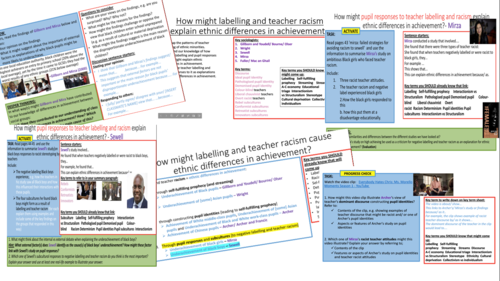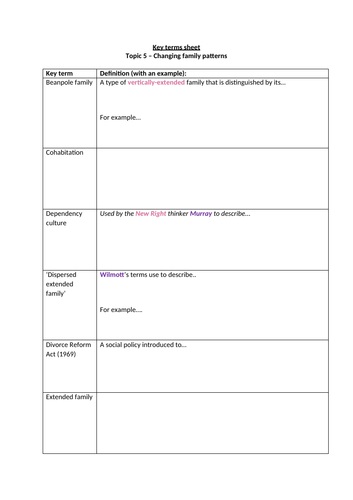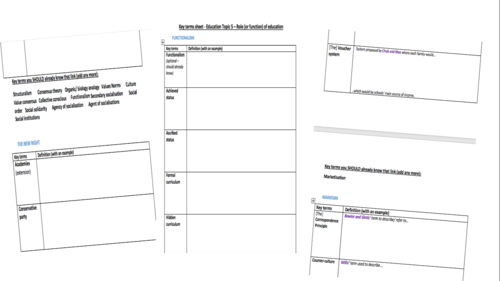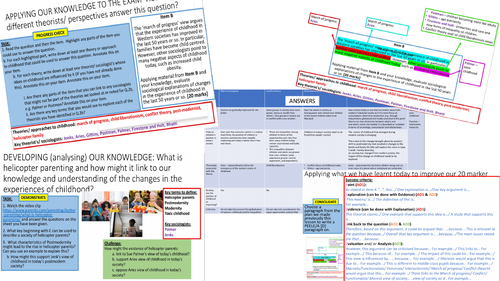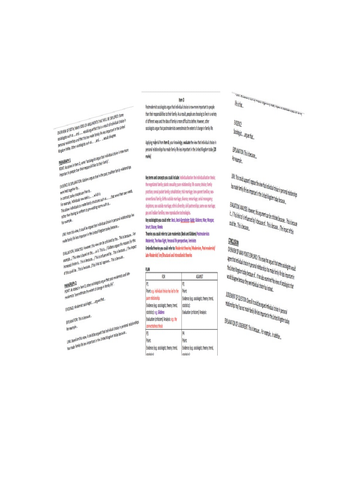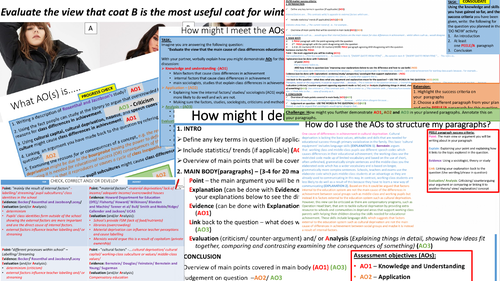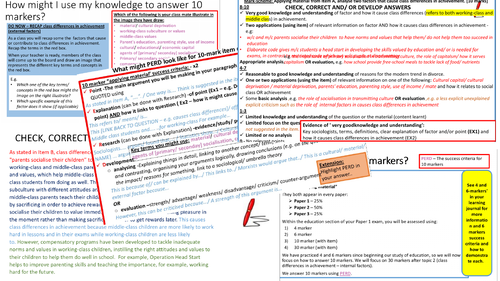
154Uploads
20k+Views
4k+Downloads
All resources

AQA A-level Sociology: Education Topic 3 Ethnic differences - Negative labelling and teacher racism
Detailed and differentiated (up and down) student led lesson that explores the following so students are able to understand and explain how negative labelling and teacher racism might cause ethnic differences in achievement:
Ideal pupil identity , Pathologised pupil identity, Demonised pupil identity, Colour-blind teachers, Liberal chauvinist teachers, Overt racist teachers, Rebels subcultures, Conformist subcultures, Retreatist subcultures, Innovators subcultures
Differentiates between Gillborn and Youdell (or Bourne or Olser), Sewell, Mirza’s view of how teachers might be racist and how this might affect achievement for different groups.
Lesson makes links to the following terms that students should have covered before completing this lesson: Labelling, Self-fulfilling prophecy, Streaming, Streams A-C economy, Educational triage, Interactionism vs Structuralism, Stereotype, Ethnicity Cultural deprivation Collectivism vs individualism.
**NOTE – Students will need to have basic to reasonable knowledge of labelling and the self-fulfilling prophecy. **
Uses and refers to ’ AQA A Level Sociology Book One Including AS Level: Book one 3rd Revised edition by Rob Webb, Hal Westergaard, Keith Trobe, Annie Townend ’ textbook
RESOURCES CAN BE FOUND AT THE END OF THE PPT.

KEY TERMS SHEET - AQA A-level Sociology Education: Topic 3 Ethnic differences in achievement
Alphabetical key term sheet for AQA A-level Sociology Education Topic 3 ethnic differences in achievement that requires students to fill out the definitions themselves.
*** Includes scaffolding, e.g. some sentence starters (to model to students how to incorporate key sociologists into their definitions) and prompts to help students remember how key term links to the topic. **
*** Includes a section with key terms that students should know from previous learning(links to key terms covered in class differences in achievement, e.g. labelling, pupil identities, material deprivation, speech codes etc) that link to this topic. **
DOES NOT INCLUDE IN TABLE key terms covered in Topic 1 & 2 Class diff key term sheet.
Good form of revision for students and can be used as a revision resource to develop AO1 once filled out.
**BASED ON CONTENT textbook - AQA A Level Sociology Book One Including AS Level: Book one 3rd Revised edition by Rob Webb, Hal Westergaard, Keith Trobe, Annie Townend ’ textbook

KEY TERMS SHEET - AQA A-level Sociology Families: Topic 5 Changing family patterns
Alphabetical key term sheet for AQA A-level Sociology Family Topic 5 Changing family patterns that requires students to fill out the definitions themselves. Includes some sentence starters for more difficult key terms.
**Good form of revision for students and can be used as a revision resource to develop AO1 once filled out. **
**BASED ON CONTENT in textbook - AQA A Level Sociology Book One Including AS Level: Book one 3rd Revised edition by Rob

KEY TERMS SHEET - AQA A-level Sociology Education: Topic 5 Role of Education
Alphabetical key term sheet for AQA A-level Sociology Education Topic 5 Role of education that requires students to fill out the definitions themselves.
*** Includes some sentence starters to model to students how to incorporate key sociologists into their definitions. **
*** Key terms separated into Functionalist, New Right and Marxist key terms. **
*** Includes a section with key terms that students should know from previous learning (intro to sociological theories and topic 1-4 of education) that link to this topic. **
Good form of revision for students and can be used as a revision resource to develop AO1 once filled out.
**BASED ON CONTENT in textbook - AQA A Level Sociology Book One Including AS Level: Book one 3rd Revised edition by Rob Webb, Hal Westergaard, Keith Trobe, Annie Townend ’ textbook

Family - Functions of the family (Parsons)
Answer to some activities included
Teaching to all activity include
No starter activity included
Key term and definition sheet for the lesson included

AQA GCSE Sociology: Families - Power in the family
Detailed lesson with lots of scaffolding based on adaptive teaching that help students understand how might power be divided in families.
Cover the following key terms: Conjugal relationships, Power
Cover the following key sociologists: Edgell, Pahl, Opinium Research, survey
Starter activity enables students to recap content they should or might have learnt before this lesson within the families unit
ANSWERS TO ALL ACTIVITIES INCLUDED
REQUIRES OWENS AND WOODFIELD AQA GCSE TEXTBOOK FOR MAIN ACTIVITIES (OR ANY EQUIVALENT INFORMATION ON DECISION MAKING AND MONEY MANAGEMENT IN THE FAMILY)
Includes icons for visual learning
RESOURCES CAN BE FOUND AT THE END OF THE PPT
Includes a discussion activity with lots of scaffolding
Includes a 3 marker with detailed scaffolding and a student friendly mark-scheme

AQA GCSE Sociology- Research methods-Official and non-official statistics
Detailed lesson with lots of scaffolding based on adaptive teaching that help students understand the difference between official and non-official statistics, the advantages and disadvantages of using official and non-official statistics to investigate sociological issues or topics.
Key terms included: Official statistics, non- official statistics
Key terms and studies you should know what link: The Millenium Cohort Study (MCS)– The British Cohort Study (BCS) - Secondary vs primary methods and data – Data - Quantitative vs qualitative data
Answers to main activities included
includes key term and definition sheet for the lesson
Resources can be found at the end of the PPT

AQA GCSE Sociology- Research Methods - Case studies
Detailed lesson with lots of scaffolding based on adaptive teaching that help students understand how to describe a case study and how it might be used to investigate sociological issues, explain the advantages and disadvantages of using a case study to investigate sociological issues.
Covers the following key terms: Case study, Mixed methods, Triangulation
Key terms and studies you should know that link: Secondary vs Primary methods and data, data, Quantitative vs Qualitative data
Resources can be found at the end of the PPT
Answers to all activities
Includes key term and definition sheet for the lessons

AQA GCSE Sociology: Family- Explaining the increase in divorce
Detailed lesson with lots of scaffolding based on adaptive teaching that explain the increase in divorce.
Includes a 4 marker with detail scaffolding to help students answer it. Includes a student-friendly mark scheme for self or peer-assessment.
Includes two versions of the table needed for the carousel activity - one with scaffolding and one without
Covers the following key terms: Secularisation, Stigma, Empty shell marriage
Covers the following sociologists: Office for National Statistics (ONS), Dennis , Fletcher, Hart, Goode, 1969 Divorce Reform Act, Mitchell & Goody
Covers the following key terms you should already know: Function (of an instituition), Individualism, Collectivism, Contemporary society, Consumerism/ Consumption
ANSWERS TO SOME MAIN ACTIVITIES INCLUDED
Makes references to key terms students should know – Promotes a spiral curriculum by making links to key terms that students might have previously been taught that link to this lesson.
RESOURCES CAN BE FOUND AT THE END OF PPT

AQA GCSE Sociology: Family - Feminist functions of the family
Includes 4 marker ‘perspective question’ on Delphy and Leonard with scaffolding to help students answer this question and others like
Includes ���teaching to all’ activity that develops students ability to draw on the sociological perspectives and ideas they have learnt to answer 12 markers.
Includes scaffolding to help students write a paragraph for a 12 marker using what they have learnt in the lesson on Delphy and Leonard’s view of the functions of the family.
ANSWERS TO MOST ACTIVITIES INCLUDED

AQA GCSE Sociology - Research Methods: How might sociologist select their sample?
Detailed lesson with lots of scaffolding based on adaptive teaching that help students understand how might sociologist select their sample for sociological research (e.g. the sampling method, consequences sampling methods may have on social research, the different types of sampling methods and how they are used.
Covers the following key terms: Target population, Sample, Sampling frame, Probability (or random sampling) vs Non-probability sampling, Simple random sampling, Systematic random sampling, Stratified random sampling, Snowball sampling, Quota sampling, Representative sample vs unrepresentative sample, Generalise; Generalisability; To make generalisations, Opportunity sampling extension), Cluster sampling (extension) and Positivists vs interpretvivists (extension)
Answers to most activities are included

AQA GCSE Sociology - Research Methods: How do sociologists collect their data?
Detailed lesson with lots of scaffolding based on adaptive teaching that help students understand how sociologist collect data for sociological research (e.g. difference between primary and secondary methods, quantitative and qualitative data, the strengths and weaknesses of primary and secondary methods, standardisation and social process
Covers the following key terms: research methods, sociological research, data, research process, Primary methods vs Secondary Methods, qualitative vs quantitative data, closed vs open questions, validity and reliability.
Answers to all main activities included
Resources can be found at the end of the PTT

AQA A-level Sociology: Education Topic 3 Ethnic differences Revision
Detailed and differentiated (up and down) student led lesson that:
uses scaffolding to guide students in making a mind-map of the topic as a revision material
-recaps the success criteria for 10 markers with item
-provides a model paragraph for a 10 marker item on this topic
-uses scaffolding to help students write their own 10 mark (item) paragraphs or full answers.
-includes 4 different 10 markers (with item). for this topic
NOTES -RESOURCES CAN BE FOUND AT THE END OF THE PPT.

L5 AQA A-level Families- Couples: Domestic violence
Detailed and differentiated (up and down) student-led lesson that examines and analyses the following key terms to examine patterns and explanations of domestic violence: Domestic violence/ abuse, Radical feminists, Materialism,
Marxist feminism, Radical feminist explanation (of domestic violence)
Marxist feminist explanation (of domestic violence),Materialist explanation (of domestic violence)
Examines the views of the following sociologists: Dobash and Dobash, Millet and Firestone, Wilkinson and Pickett, Ansley
***** Makes reference to other key terms students might know that link. **
***** ANSWERS to MAIN activities INCLUDED****
Uses and refers to ’ AQA A Level Sociology Book One Including AS Level: Book one 3rd Revised edition by Rob Webb, Hal Westergaard, Keith Trobe, Annie Townend ’ textbook

A-level Sociology Education Class differences in achievement - Labelling
Detailed and differentiated (up and down), student led lesson that explores labelling, self-fulfilling-prophecy/ pygmallion effect, determinism and interactionism to enable students to understand the role of labelling in causing class differences in achievement/ working-class underachievement/ middle-achievement.
**ANSWERS TO MOST ACTIVITIES **
**COMES WITH FREE A-LEVEL HELP SHEET
**Made for AQA A-level but can be easily used for other specs (just need a different source of information/ textbook) **
Uses and refers to ’ AQA A Level Sociology Book One Including AS Level: Book one 3rd Revised edition by Rob Webb, Hal Westergaard, Keith Trobe, Annie Townend ’ textbook

AQA A-level Sociology: Families Topic 2 ‘Childhood’ Revision lesson
Detailed and differentiated (up and down) student led lesson that supports students in recapping the main theories, views and explanations of the position of childhood; examines how march of progress, conflict, child liberationists and postmodernist theories’ view society and how this might influence their approach or view of childhood and its changes over time. Also highlights the key sociologists (Katz, Postman, Aries, Palmer, Jenks, Gittens) in this topic.
The lesson then requires students to apply this knowledge to plan (using a success criteria) a 20 marker and write at least one paragraph for it.
RESOURCES CAN BE FOUND AT THE END OF THE PPT.
MODEL PLAN AND ANSWERS FOR MAIN ACTIVITY CAN BE FOUND ON NEXT SLIDE AFTER ACTIVITY SLIDE

WRITING FRAME - AQA A-level Sociology: Families – Topic 3 Theories of the family 20 marker
Detailed writing frame that scaffolds (from introduction to conclusion) a full answer for a 20 marker on the family being beneficial (family -topic 3 theories of the family). Models how to use the item to select points or arguments to answer the question.
*** Based on AQA specification**
Supports students with planning the 20 marker (using the item) - using planning success criteria.
Outlines the success criteria and provides sentence starters for the full essay (intro, main body and conclusion). Success criteria used for paragraphs in main body of essay is PEELE/A
Outlines the key terms, sociologists, theories that can be used when answering the question.
Supports students who need support and guidance with writing essays whilst providing students who are already good at writing essays opportunities to further improve their essay skills.

WRITING FRAME - AQA A-level Sociology: Families – Topic 6 Family diversity 20 marker
Detailed writing frame that scaffolds (from introduction to conclusion) a full answer for a 20 marker on evaluating the view that individual choice in personal relationships has made family life less important in the United Kingdom today (family -topic 6 family diversity).
*** Based on AQA specification**
Models and supports students with how to use the item to select points or arguments to answer the question and how to plan essays using planning success criteria.
Outlines the success criteria and provides sentence starters for the full essay (intro, main body and conclusion). Success criteria used for paragraphs in main body of essay is PEELE/A
Outlines the key terms, sociologists, theories that can be used when answering the question.
Supports students who need support and guidance with writing essays whilst providing students who are already good at writing essays opportunities to further improve their essay skills.

Sociology Education Class differences in achievement- How to answer 30/ 20 markers?
Detailed and differentiated (up and down), student led lesson that explores:
the main assessement objectives - AO1, AO2, AO3
how to answer 30 markers
allows studeNts to revise class differences in achievement (external and internal factors).
**Can also be used as a revision lesson for topic 2 (class diff in achievement -internal factors) Includes student friendly success criteria for essay **
ANSWERS TO MAIN ACTIVITIES AND MODEL ANSWER INCLUDED
Made for AQA A-level but is applicable for AS-Level and can be used for ANY SPEC and is still paplicable for GCSE essays

How to answer 10 markers for Sociology Education Class differences in achievement (external factors)
Detailed and differentiated (up and down), student led lesson that explores how to answer 10 markers, in particular for education topic 1 - class differences in achievement (external factors). Can also be used as a revision lesson for topic 1 (class diff in achievement -external factors) Includes student friendly success criteria PERD (Point+Explanation+Research+Develop) success criteria and student-friendly mark-scheme.
ANSWERS TO MAIN ACTIVITIES AND EXAM QUESTIONS ARE INCLUDED
**Made for AQA A-level but can be easily used for other specs (just need a different source of information/ textbook) differentiated down for GCSE) lesson **

